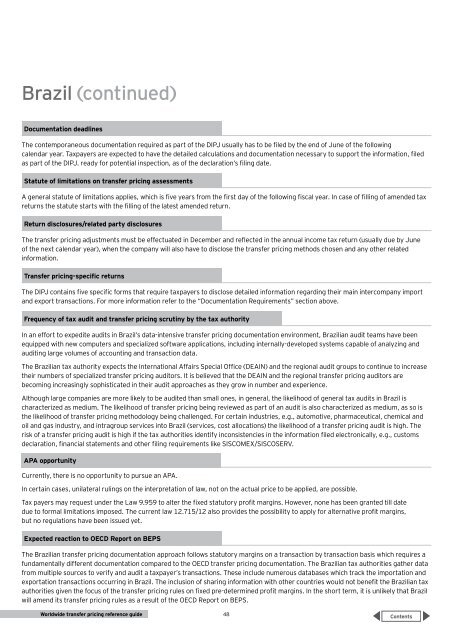Worldwide transfer pricing reference guide 2014
Create successful ePaper yourself
Turn your PDF publications into a flip-book with our unique Google optimized e-Paper software.
Brazil (continued)<br />
Documentation deadlines<br />
The contemporaneous documentation required as part of the DIPJ usually has to be filed by the end of June of the following<br />
calendar year. Taxpayers are expected to have the detailed calculations and documentation necessary to support the information, filed<br />
as part of the DIPJ. ready for potential inspection, as of the declaration’s filing date.<br />
Statute of limitations on <strong>transfer</strong> <strong>pricing</strong> assessments<br />
A general statute of limitations applies, which is five years from the first day of the following fiscal year. In case of filling of amended tax<br />
returns the statute starts with the filling of the latest amended return.<br />
Return disclosures/related party disclosures<br />
The <strong>transfer</strong> <strong>pricing</strong> adjustments must be effectuated in December and reflected in the annual income tax return (usually due by June<br />
of the next calendar year), when the company will also have to disclose the <strong>transfer</strong> <strong>pricing</strong> methods chosen and any other related<br />
information.<br />
Transfer <strong>pricing</strong>-specific returns<br />
The DIPJ contains five specific forms that require taxpayers to disclose detailed information regarding their main intercompany import<br />
and export transactions. For more information refer to the “Documentation Requirements” section above.<br />
Frequency of tax audit and <strong>transfer</strong> <strong>pricing</strong> scrutiny by the tax authority<br />
In an effort to expedite audits in Brazil’s data-intensive <strong>transfer</strong> <strong>pricing</strong> documentation environment, Brazilian audit teams have been<br />
equipped with new computers and specialized software applications, including internally-developed systems capable of analyzing and<br />
auditing large volumes of accounting and transaction data.<br />
The Brazilian tax authority expects the International Affairs Special Office (DEAIN) and the regional audit groups to continue to increase<br />
their numbers of specialized <strong>transfer</strong> <strong>pricing</strong> auditors. It is believed that the DEAIN and the regional <strong>transfer</strong> <strong>pricing</strong> auditors are<br />
becoming increasingly sophisticated in their audit approaches as they grow in number and experience.<br />
Although large companies are more likely to be audited than small ones, in general, the likelihood of general tax audits in Brazil is<br />
characterized as medium. The likelihood of <strong>transfer</strong> <strong>pricing</strong> being reviewed as part of an audit is also characterized as medium, as so is<br />
the likelihood of <strong>transfer</strong> <strong>pricing</strong> methodology being challenged. For certain industries, e.g., automotive, pharmaceutical, chemical and<br />
oil and gas industry, and intragroup services into Brazil (services, cost allocations) the likelihood of a <strong>transfer</strong> <strong>pricing</strong> audit is high. The<br />
risk of a <strong>transfer</strong> <strong>pricing</strong> audit is high if the tax authorities identify inconsistencies in the information filed electronically, e.g., customs<br />
declaration, financial statements and other filing requirements like SISCOMEX/SISCOSERV.<br />
APA opportunity<br />
Currently, there is no opportunity to pursue an APA.<br />
In certain cases, unilateral rulings on the interpretation of law, not on the actual price to be applied, are possible.<br />
Tax payers may request under the Law 9.959 to alter the fixed statutory profit margins. However, none has been granted till date<br />
due to formal limitations imposed. The current law 12.715/12 also provides the possibility to apply for alternative profit margins,<br />
but no regulations have been issued yet.<br />
Expected reaction to OECD Report on BEPS<br />
The Brazilian <strong>transfer</strong> <strong>pricing</strong> documentation approach follows statutory margins on a transaction by transaction basis which requires a<br />
fundamentally different documentation compared to the OECD <strong>transfer</strong> <strong>pricing</strong> documentation. The Brazilian tax authorities gather data<br />
from multiple sources to verify and audit a taxpayer’s transactions. These include numerous databases which track the importation and<br />
exportation transactions occurring in Brazil. The inclusion of sharing information with other countries would not benefit the Brazilian tax<br />
authorities given the focus of the <strong>transfer</strong> <strong>pricing</strong> rules on fixed pre-determined profit margins. In the short term, it is unlikely that Brazil<br />
will amend its <strong>transfer</strong> <strong>pricing</strong> rules as a result of the OECD Report on BEPS.<br />
<strong>Worldwide</strong> <strong>transfer</strong> <strong>pricing</strong> <strong>reference</strong> <strong>guide</strong><br />
48


